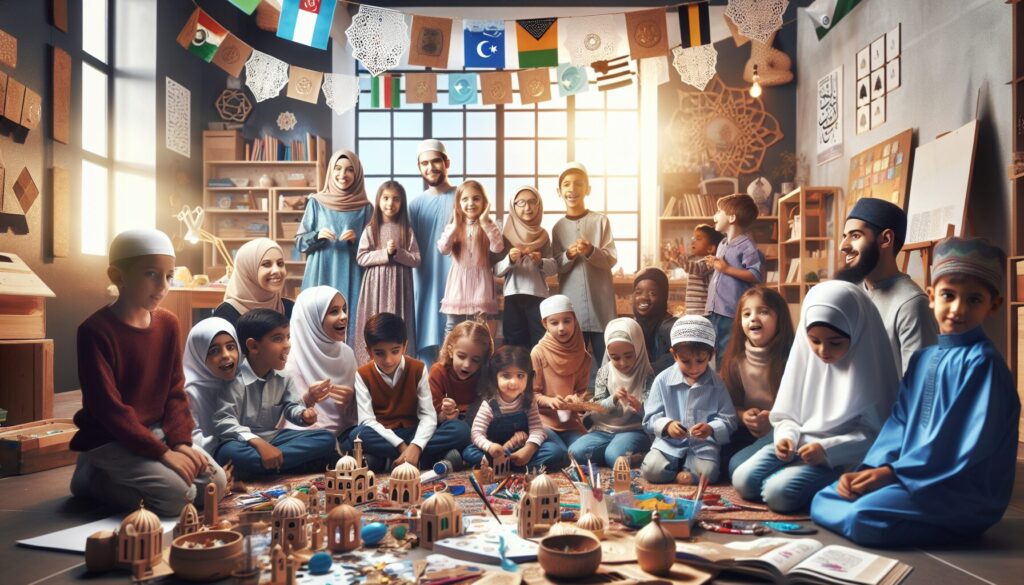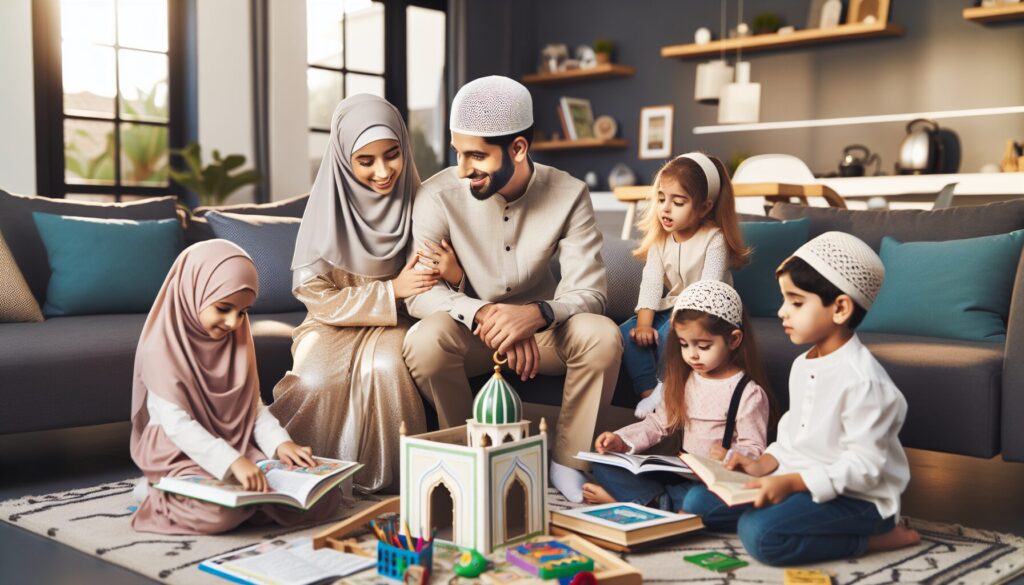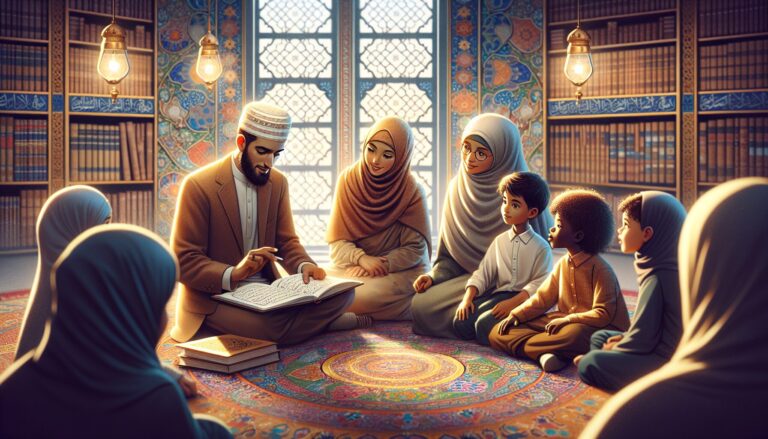Hey there, fellow parents in Canada! Isn’t it just the best when the weekend finally rolls around? I remember when my kids were little, and we’d spend Saturday mornings trying to find the perfect balance between fun and educational activities. One weekend, we stumbled upon a community event at a local mosque, and it was a game-changer! The kids got to learn about Islamic stories and even tried their hand at calligraphy. They were so excited to share what they learned, and it sparked a newfound curiosity about their heritage. Islamic activities for kids’ weekends can be such a fantastic way to blend fun with learning, all while keeping those little minds engaged and exploring their cultural roots.
Crafting and DIY Islamic Art Projects

Get ready to dive into a world of creativity with crafting and DIY Islamic art projects for kids! It’s a fantastic way to combine fun with a sprinkle of cultural learning. Picture this: a cozy weekend at home, the table covered in colorful paper, glue sticks, and a variety of craft supplies. The kids are all set to unleash their imagination, and you’re there, guiding them to create something truly special.
Why crafting is amazing: First off, it’s an excellent way to keep the little ones busy and engaged. Plus, crafting encourages creativity and helps develop fine motor skills. The best part? You don’t need to be an art expert! Just gather some basic supplies, and you’ll be amazed at what the kids can create.
Fun Islamic Art Projects
To kick things off, consider making a colorful mosaic using construction paper. Cut paper into small pieces and let the kids arrange them into intricate patterns, inspired by Islamic geometric art. Not only is this visually appealing, but it also teaches children about symmetry and precision.
Another exciting project is creating DIY lanterns, perfect for adding a warm glow to any room. Use simple materials like paper cups, paint, and LED candles. Once painted and decorated, these lanterns can light up your home with a cozy, festive vibe. This project is a hit during Ramadan or Eid celebrations and can be an opportunity to discuss the significance of these occasions with your kids.
If you’re up for a challenge, try making a 3D mosque model. Using cardboard, construction paper, and a bit of imagination, kids can create a structure that resembles traditional mosque architecture. This project is a fantastic way to explore architectural styles and discuss their historical and cultural importance. Plus, it’s a great opportunity to mention organizations like Islamic Society of North America and Muslim Association of Canada that often host art workshops and exhibitions.
Don’t forget to incorporate some calligraphy. It’s a beautiful art form and can be a calming activity. Start with simple words or phrases in Arabic, using markers or paintbrushes. Calligraphy not only enhances writing skills but also introduces kids to the beauty of the Arabic alphabet.
For those chilly Canadian weekends, crafting offers a cozy indoor activity. It’s a delightful way for kids to learn, express themselves, and appreciate their cultural heritage.
Exploring Islamic Stories and Books
Exploring Islamic stories and books can be an absolute delight for kids, offering them a window into a rich tapestry of history, values, and creativity. If you’re looking for a meaningful way to spend time with your little ones over the weekend, diving into these tales can be both fun and educational!
Start by visiting your local library or bookstore. Canadian libraries often have a fantastic selection of Islamic children’s books. You might be surprised at how many beautifully illustrated stories are available, each one telling tales of incredible journeys, moral lessons, and fascinating characters. Libraries in cities like Toronto and Vancouver often feature events or reading corners focusing on diverse cultures, including Islamic literature. Make sure to check out what’s happening at your local branch.
Another fantastic way to explore these stories is through storytelling sessions. Many community centers and mosques host events where children can listen to a storyteller bring these tales to life. It’s not just about reading; it’s about experiencing the story in a way that captivates your child’s imagination. Check out events hosted by Canadian Children’s Book Centre or Islamic Foundation of Toronto for some great storytelling opportunities.
Interactive Learning with Islamic Stories
Interactive activities can make these stories even more engaging. After reading a book, encourage your kids to draw their favorite scene or create a small play based on the story. This not only helps with comprehension but also nurtures their creativity. You could even organize a little family play at home, with everyone taking on a role from the story. It’s a delightful way to spend a Saturday afternoon together.
For a more digital approach, there are several apps and online resources that offer interactive Islamic stories. These platforms often include games, quizzes, and activities related to the stories, making learning more dynamic. However, always ensure the content is age-appropriate and aligns with your family’s values.
Additionally, you can weave in some practical learning by exploring how these stories connect to everyday life. Discuss with your kids how the values and lessons from these tales can apply to their own experiences. This is a great way to naturally incorporate lessons from practical halal meal planning into your family’s routine, helping them understand the importance of integrating values into daily practices.
By introducing your kids to Islamic stories and books, you’re not just filling their weekend with fun activities. You’re opening up a world of knowledge and values that can shape their understanding and appreciation of the world around them.
Engaging in Fun and Educational Islamic Games
Playing games is such a delightful way to engage kids in learning, especially when it comes to Islamic themes. These games aren’t just fun; they’re educational too, helping to nurture curiosity and reinforce values in a way that’s both enjoyable and memorable. Let’s dive into some amazing game ideas that can light up your weekend with joy and learning!
Board games are a fantastic starting point. Consider games like “Journey Through the Quran,” where kids can move through the board by answering questions about various Surahs and stories. It’s not only educational but also a great way to spend family time together. Another fun idea is a DIY trivia game. You can create your own set of questions about Islamic history, famous figures, or moral lessons. Trust me, the kids will love the challenge and the chance to learn in a playful setting!
Interactive Group Activities
For something more interactive, try organizing a treasure hunt with an Islamic twist. You can hide clues around the house or garden that lead to a treasure chest filled with treats or small gifts. Each clue can be a fun fact or a short riddle related to Islamic teachings or history. It’s a great way to get kids moving and thinking critically. Plus, it adds a sense of adventure to their learning experience.
Role-playing games are another excellent choice. Encourage the kids to act out stories from Islamic history or tales of famous Muslim explorers and scientists. This not only builds their confidence but also helps them understand historical contexts and the significance of these figures. It’s like bringing history to life right in your living room!
Incorporating technology can also enhance their learning experience. There are some fantastic educational apps and online games focused on Islamic teachings. These apps make learning interactive and fun, providing a modern twist to traditional education. Just ensure that screen time is balanced with other activities.
Craft activities can double as games too. For example, have the kids create their own Islamic geometric art using colored paper or paints. Not only is this a creative outlet, but it also helps them appreciate the intricate designs and cultural significance of this art form. You could even turn it into a friendly competition to see who can create the most elaborate design!
For community engagement, consider reaching out to local organizations like Canadian Council of Muslim Women or Muslim Association of Canada for event ideas or collaborative projects. Many communities host weekend workshops or events that are both educational and fun for kids. It’s a wonderful opportunity for your children to make new friends and learn in a group setting.
Engaging in these Islamic activities for kids during the weekend not only offers a chance to learn but also helps strengthen their cultural and religious identity in a fun and supportive environment. With a mix of traditional and modern approaches, there’s something for every child to enjoy and benefit from!
Participating in Community and Mosque Events

Getting involved in community and mosque events is an amazing way for kids to dive into the vibrant world of Islamic culture and values. In Canada, where diversity is as rich as maple syrup, these gatherings offer a unique chance for children to connect with their heritage while making new friends. Plus, these events often come with the added bonus of delicious food and heartwarming stories!
First of all, attending mosque events is a fantastic opportunity for kids to engage in Islamic Activities for Kids Weekend. Mosques often host a variety of events that cater to young ones. From storytelling sessions centered around Islamic tales to art workshops where kids can create beautiful geometric patterns, there’s something for everyone. These activities not only teach children about their faith but also allow them to express their creativity in a supportive environment. It’s a win-win!
Additionally, community events organized by local groups like Muslim Association of Canada and Canadian Council of Muslim Women are excellent platforms for kids to learn and participate. These events can range from educational fairs to sports days. They offer children a chance to see their faith in action beyond the mosque and understand the importance of community service. Imagine your little one learning the value of charity by participating in a fun run to raise funds for a good cause. It’s inspiring, right?
Celebrations and Workshops
Festive occasions like Ramadan and Eid come alive with events that are as colorful as they are educational. During Ramadan, mosques and community centers might organize iftar gatherings for families. It’s a delightful way for kids to learn about the significance of fasting and breaking the fast in a communal setting. Eid celebrations, on the other hand, often include fun fairs and carnivals, where children can enjoy rides, games, and perhaps even a henna booth. These experiences help them create cherished memories while learning about their cultural roots.
Moreover, workshops are another engaging option. Whether it’s a cooking class where kids can learn to prepare traditional dishes or a calligraphy session to write beautiful Arabic scripts, these workshops offer hands-on learning experiences. They can be organized by local mosques or community groups like the Canadian Children’s Book Centre. Such activities encourage children to explore different facets of their culture while having a blast.
So, why wait? Dive into the world of community and mosque events and watch your kids flourish. It’s a joy to see them grow and learn in such a nurturing environment.
Cooking Simple Islamic Recipes Together
Cooking with kids can be such a delightful experience! When I was young, my mom and I used to spend Sunday afternoons in the kitchen, creating simple dishes that filled our home with warmth and delicious aromas. It’s a great way to bond, teach life skills, and introduce kids to new cultures and traditions. Let’s dive into some fun and simple Islamic recipes that you can try with your little ones over the weekend!
Safety First: Always supervise children in the kitchen. Discuss safety rules before you start, such as using oven mitts and being careful with knives.
Sweet and Savory Delights to Try
Cooking together is a wonderful activity to incorporate into your weekend plans. Here are a few simple recipes that you can make with your kids:
- Mini Samosas: These little pastry pockets are perfect finger food for kids. Let them fill the samosas with a mixture of spiced potatoes, peas, and carrots. Use store-bought pastry sheets to save time and ensure that the samosas are kid-friendly and not too spicy.
- Stuffed Dates: Dates are a staple in many Islamic cultures for their natural sweetness and nutritional value. Stuff them with cream cheese or almond butter, and finish with a sprinkle of crushed nuts for a simple yet satisfying treat.
- Falafel Bites: Falafel is a popular Middle Eastern snack made from chickpeas or fava beans. Use a food processor to blend the ingredients and let the kids shape the mixture into small balls before baking or frying them.
These recipes not only provide an opportunity to enjoy tasty treats but also open a window into the rich culinary heritage of Islamic cultures. As you cook, share stories about different ingredients and their significance. For instance, explain how dates are traditional during Ramadan or how samosas have become a beloved snack worldwide.
Additionally, consider getting involved with organizations like the Muslim Association of Canada or the Canadian Council of Muslim Women. They often have resources or events that can further enrich your family’s cultural experiences.
Cooking together can turn the kitchen into a classroom and a playground. It’s not just about the end result but the entire journey—mixing, tasting, and, yes, even cleaning up. These moments create cherished memories and form a deeper understanding of different cultures.
Conclusion
Ultimately, weaving Islamic activities into your weekend plans can create a rich tapestry of learning, creativity, and cultural appreciation for your children. By engaging in arts and crafts, exploring stories, playing educational games, participating in community events, and sharing simple recipes, you provide your kids with a nurturing environment that celebrates their heritage and values. So, gather your family, embrace the joy of discovery, and enjoy a weekend filled with meaningful connections and delightful experiences. Happy exploring!
Continue Exploring
Unlock the secrets to an engaging weekend that blends fun with learning through Islamic teachings, perfect for your kids. Dive into our beginner’s guide and transform your weekends into memorable, educational adventures!
Frequently Asked Questions
What are some Islamic art projects that kids can do at home?
Kids can explore Islamic art through projects like creating colorful mosaics using construction paper, crafting DIY lanterns with paper cups and LED candles, and making 3D mosque models using cardboard. These activities are not only creative but also educational, teaching children about Islamic geometric art, symmetry, and historical architecture.
How can Islamic stories be made more engaging for children?
To make Islamic stories more engaging, consider organizing storytelling sessions where kids can listen to stories brought to life by a storyteller. Interactive activities like drawing favorite scenes or acting out small plays based on the stories can enhance comprehension and creativity. Additionally, there are apps and online resources offering interactive Islamic stories with games and quizzes.
What types of community events are available for kids to learn about Islamic culture?
Community events for kids include mosque-hosted storytelling sessions, art workshops, and celebrations during Ramadan and Eid. These events offer children a chance to learn about their faith and cultural heritage in a fun and supportive environment. Community groups like the Muslim Association of Canada often organize educational fairs and sports days to further engage children in learning about Islamic values.
Fatima Ansari is an Islamic educator and writer with over a decade of experience teaching Quran and Islamic studies to children and families in Western Muslim communities. Growing up in North America, she saw firsthand the challenges Muslim families face in balancing faith with modern life, which inspired her to share practical guidance rooted in the Quran and Sunnah. Her mission with E-Quran Learning is to make Islamic education accessible, relatable, and inspiring for Muslim families across the United States, United Kingdom, Canada, Australia, and New Zealand.






